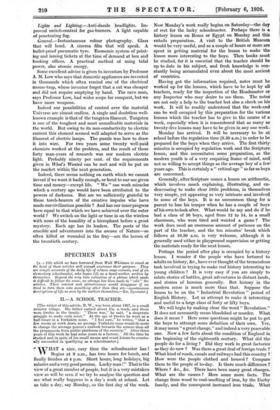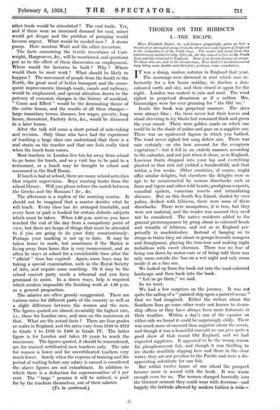SPECIMEN DAYS
P . a title which we have borrowed from Walt Whitman to stand at the head of these articles well enough expresses their purpose. They are simple accounts of the daily life of certain wage-earners, and of an elementary schoolmaster, who began life as a hand-worker, written by themselves. Beyond the very rare correction of a phrase which made it difficult to follow the sense, no attempt has been made to " edit" the articles. Their interest and attractiveness would disappear if we tried to turn them into something other than they are—spontaneous descriptions of life as seen by the workers themselves.—ED. Spectator.] II.—A SCHOOL TEACHER.
[The writer of this article, R. W., was born about 1897, in a small country village. His father earned about 25s. a week, and there were twelve in the family. " There was," he said, " a desperate struggle to make ends meet." At the age of twelve he went as a half-timer in a Yorkshire mine. " I feel sure," he writes, " that a few weeks at work down an average Yorkshire mine would do more to change the average person's outlook towards the miners than all The propaganda from public platforms of the country." After three years of this work he had some years in a factory. All the time he studied and in spite of his small means and scant leisure he eventu- ally succeeded in qualifying as a schoolmaster.] WHAT a nice, easy time the schoolmaster has ! Begins at 9 a.m., has two hours for lunch, and finally finishes at 4 p.m. Short hours, long holidays, big salaries and a very good pension. Lucky man !" That is the view of a great number of people, but it is a very mistaken view as will be seen if we try to analyse the question and !see what really happens in a day's work at school: Let .us take a day, say Monday, as the first day of the week. Now Monday's work really begins, on Saturday—the day of rest for the lucky schoolmaster. Perhaps there is a history lesson on Rome or Egypt on Monday and this entails preparation. A visit to the British Museum would be very useful, and so a couple of hours or more are spent in getting material for the lesson to make the lesson more interesting to the boys. Then books must be studied, for it is essential that the teacher should be up to date in his subject, and fresh knowledge is con-' stantly being accumulated even about the most ancient of countries.
Having got the information required, notes must be worked up for the lessons, which have to be kept by all teachers, ready for the inspection of the Headmaster or any Inspector who may desire to see them. The notes are not only a help to the teacher but also a check on his work. It will be readily understood that the week-end can be well occupied by this preparation for the various lessons which the teacher has to give in the course of a' week, especially when it is remembered that as many as twenty-five lessons may have to be given in any one week.: Monday has arrived. It will be necessary to be at school before the regulation time (8.50 a.m.) in order to be prepared for the boys when they arrive. The first thirty minutes is occupied by regulation work and the Scripture, lesson, and this necessitates some preparation, as the modern youth is of a very enquiring frame of mind, and not so willing to accept things as the average boy of a few years ago. This is certainly a " critical age " so far as boys are concerned.
Generally, after Scripture comes a lesson on arithmetic, which involves much explaining, illustrating, and en- deavouring to make clear little problems, in themselves. very simple, yet appearing so very intricate and involved to some of the boys. It is no uncommon thing for a parent to lose his temper when he has a couple of boys of his own to look after. What would he say and do if he had a class of 50 boys, aged from 12 to 14, in a small classroom, who were tired and wanted a game ? The work does need an enormous amount of patience on the part of the teacher, and the ten minutes' break which follows at 10.30 a.m. is very welcome, although it is generally used either in playground supervision or getting the materials ready for the next lesson.
Perhaps the period after play is occupied by a history lesson. I wonder if the people who have lectured to adults on history, &c., have ever thought of the tremendous task involved in trying to make real history interesting to young children ? It is very easy if you are simply to relate stories of battles, great adventures in distant lands, and stories of heroism generally. But history in the modem sense is much more than that. Suppose the lesson to be on the " Industrial Revolution " period of English History. Let us attempt to make it interesting and useful to a large class of forty or fifty boys.
We will begin by making clear the word " Revolution." It does not necessarily mean bloodshed or murder. What does it mean ? Here some questions might be put to get the boys to attempt some definition of their own. Yes, it may mean " a great change," and indeed a very peaceable one. Now a few facts about the condition of England in' the beginning of the eighteenth century. What did the' people do for a living ? Did they work in great factories as they do now ? Was there a great deal of foreign trade ? What kind of roads, canals and railways had this country ? How were the people clothed and housed ? Compare them to the people of to-day. Is there much difference.? Where ? &c., &c. There have been many great changes. What are the causes ? Here some more facts. The''. change from wood to coal-smelting of iron, by the Darby family, and the consequent increased iron trade. What other trade would be stimulated ? The coal trade. Yes, and if there were an increased demand for coal, mines would get deeper and the problem of pumping would become urgent. What would be needed now ? A steam pump. Here mention Watt and the other inventors.
The facts concerning the textile inventions of Cart- wright, Hargreaves, &e., will be mentioned, and questions put as to the effect of these discoveries on employment. Where would the factories be built ? Why ? Where would there be most work ? What should be likely to happen ? The movement of people from the South to the North, the great need of better transport and the conse- quent improvements through roads, canals and railways, would be emphasized, and special attention drawn to the potency of economic changes in the history of mankind. " Cause and Effect " would be the dominating theme of the entire lesson, and the results of all these changes— large insanitary towns, diseases, low wages, poverty, long hours, discontent, Factory Acts, &c., would be discussed in a later lesson.
After the talk will come a short period of note-taking and revision. Only those who have had the experience of teaching a large class can understand that there is a real strain on the teacher and that one feels really tired when the lunch hour comes.
Most teachers in London live too far away from school to go home for lunch, and so a visit has to be paid to a restaurant, or a lunch may be brought to school and consumed in the Staff Room.
If lunch is had at school, there are many school activities that require supervision. Boys wanting books from the school library. Will you please referee the match between the Greeks and the Romans ? &c., &c.
The afternoon is a replica of the morning session. It should not be imagined that a master decides what he will teach. Every class has its arranged timetable, and every hour or part is booked for certain definite subjects which must be taken. When 4.30 p.m. arrives you have reached the end of the day from a compulsory point of view, but there are heaps of things that must be attended to if you are going to do your duty conscientiously. Perhaps your marking is not up to date. It may be taken home to mark, but sometimes if the Master is living away from home this is very inconvenient, and so often he stays at school for a considerable time after the " official " time has expired. Again, some boys may be taking a special examination, such as the Royal Society of Arts, and require some coaching. Or it may be the school concert party needs a rehearsal and you have promised to assist. In a dozen ways, help is required which renders impossible the finishing work at 4.30 p.m. as a general proposition.
The salaries are often grossly exaggerated. There are various rates for different parts of the country as well as a slight difference between the women and the men. The figures quoted are almost invariably the highest rate, i.e., those for London men, and men on the maximum at that. What are the actual facts ? There are four grades or scales in England, and the rates vary from £168 to £312 in Grade 1 to £192 to £408 in Grade IV. The latter figure is for London and takes 19 years to reach the maximum. The figures quoted, it should be remembered, are for trained certificated men teachers only. The rate for women is lower and for uncertificated teachers very much lower.. Surely when the expense of training and the period of waiting before any salary is earned is considered the above figures are not exhorbitant. In addition to 'which there is a deduction for superannuation of 5 per vent. The " large " pension it will be noticed, is paid `for by the teachers themselves, out of their salaries.
(To be continued.)



























































 Previous page
Previous page